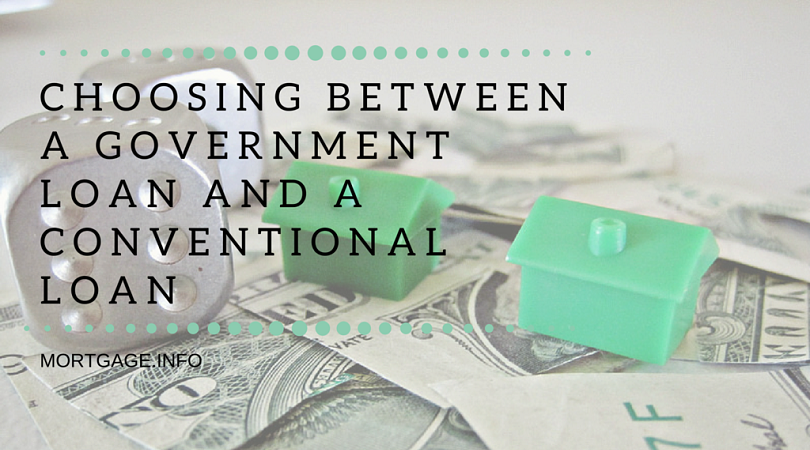
There are many choices out there today when you are in the market for a home loan. A government loan, such as those from the FHA or VA offer flexible terms, attractive rates, and a guarantee for the lender should you default in the future. A conventional loan from a private lender does not offer the same guarantee, but sometimes has more attractive rates and terms depending on the risk level of your loan file. So how do you decide between the two options? Here are some questions to ask yourself.
Do you want a Commercial or Private Lender?
The first question is to determine if you want to go with a large, commercial lender or a private lender. There are both options available to you, but the commercial lender will be more restricted in what they can offer you. Commercial lenders have to stick to the mainstream loans and requirements whereas a private lender can make their own rules, providing you with the opportunity for a unique loan program that may be tailored to your specific needs.
What Type of Down Payment do you Have?
The biggest question is determining how much you want to put down on the home. If you only have 3.5 percent, which is the minimum for an FHA loan or you don’t have anything to put down and you are a qualifying veteran that can obtain a VA loan, then government-backed loans are the best option for you.
While the Fannie 97 is a conventional loan that allows just 3 percent down, the interest rate and private mortgage insurance are typically fairly expensive, making the FHA loan a better option for you if you can scrape up that extra 0.5 percent to put down. On the other hand, if you have 20 percent or even 10 percent to put down, you may want to consider going the conventional route, whether from a private or mainstream commercial lender as long as you have a good credit score and decent debt ratio to allow you to qualify.
Do you Have Special Circumstances?
Oftentimes special circumstances require you to go the conventional loan route simply because you will have an easier time finding a lender that can bend the rules for you a little bit based on your compensating factors. Government loans have very strict guidelines because the FHA and VA back them up. This is not to say the rules are rigid and there are never any exceptions, but you will have a slightly harder time getting those exceptions if you go the government route because they are held to such strict requirements after the downfall of the economy and the housing crisis. If anything seems out of the ordinary and does not pass the Ability-to-Repay Rules or the Dodd-Frank Rules, you could have the right to sue the lender if you were to default on the loan, which most lenders do not want to risk, so they instead turn the loan down. A loan from a private lender going the conventional route, however, has a little more leeway, especially if they plan on keeping the loan on their own books rather than selling it on the secondary market because they do not have to abide by certain rules, giving you a little more room to qualify.
What Type of Interest Rate do you Need?
Interest rates are hard to predict, however, a government loan has a higher tendency of providing you with a lower rate than a private lender may be able to offer simply because a private lender does not have the same level of funding the government does. It costs private lenders more money to do business with you and they don’t have as many reserves as the government loans have, which puts their portfolio at a higher risk should you default on the loan. This is not to say that government loans always have lower interest rates than private lender loans, though; you should shop around to see which loan has the best rate for you given your circumstances. For example, if you are not putting 20 percent down on the loan, you have to figure in private mortgage insurance on a conventional loan until you reach 80 percent LTV on the home, but on an FHA loan, you have to consider mortgage insurance for the life of the loan. This should be figured into your calculations as you try to determine which loan will be the most affordable for you not only now, but in the long run.
Determining the right loan type is something that is a very personal decision. It is best to weigh the pros and cons of each type of loan you are able to apply for and make your decision from there. A qualified lender that can provide FHA and conventional loans could be the easiest way to determine the right choice for you, but shopping around with various lenders is also a good idea as you can get a better feel for what options are out there regarding various programs as well as interest rates and costs.
